Los Angeles
Kimmel, Jarrett, Emanuel and Lorri Jean spotlight decency at LA LGBT Center gala
LGBT-straight coalition exemplifies humanity in Trump era
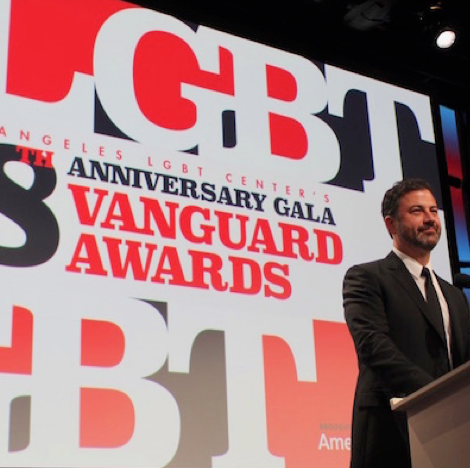
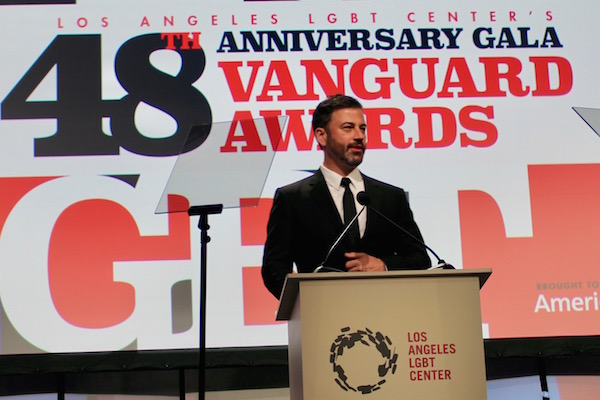
Jimmy Kimmel speaks at LA LGBT Center gala at Beverly Hilton Hotel Sept. 23, 2017 (Photo by Karen Ocamb)
Something happened at the Los Angeles LGBT Center’s 48th Anniversary Gala Vanguard Awards Saturday night, Sept. 23. It was as if the sold out suit-and-gown crowd at the Beverly Hilton Hotel took a knee in solidarity with each other and the growing effort to resist Reality TV star President Donald Trump’s pursuit of hostile divisiveness. In addition to saluting honorees Valerie Jarrett, former Senior Advisor to President Barack Obama, and Hollywood super agent Ari Emanuel, TV host and comedian Jimmy Kimmel and Center CEO Lorri Jean underscored how pushing back against Trump is an imperative fight to preserve American democracy and simple human decency.
The gala skirted that shimmering elite frat party feel for a simple elegance more befitting the budding development of a new coalition for compassion, three decades after AIDS forced the fight for humanity into the public discourse. Now it’s the latest Republican attempts to repeal the Affordable Care Act with a plan that could eliminate Medicaid and protections for pre-existing conditions, a cause Kimmel has heroically taken on. (See the Center’s Action Alert here. )
Trump’s Huntsville, Alabama rally Friday night was also a jaw-dropping hot topic, with the president telling NFL owners to fire any player who takes a knee and “disrespects” the Flag during the national anthem. “You’re fired!” he said, reprising his “Apprentice” role to much applause. Trump later said his comments had nothing to do with race, even though the protest started one year ago, Aug. 26, 2016, precisely because of institutionalized racism and the fatal shootings of unarmed black men by white police officers who are rarely held accountable.
“I am not going to stand up to show pride in a flag for a country that oppresses black people and people of color,” then-San Francisco 49ers quarterback Colin Kaepernick told NFL Media. “To me, this is bigger than football and it would be selfish on my part to look the other way. There are bodies in the street and people getting paid leave and getting away with murder.”
Trump’s remarks sparked an intense backlash throughout the country. “It’s exhausting to have a president who gets angrier at outspoken black athletes than at Nazis,” writes The Nation’s sports editor Dave Zirin. “These athletes are doing a lot more than sitting or kneeling or raising a fist during the anthem. They are offering up an alternative model for unity, justice, and even manhood. They are showing that what makes an adult is whom you can help, not whom you can cuss, and certainly not whom you can destroy for shameless and divisive political gain.”
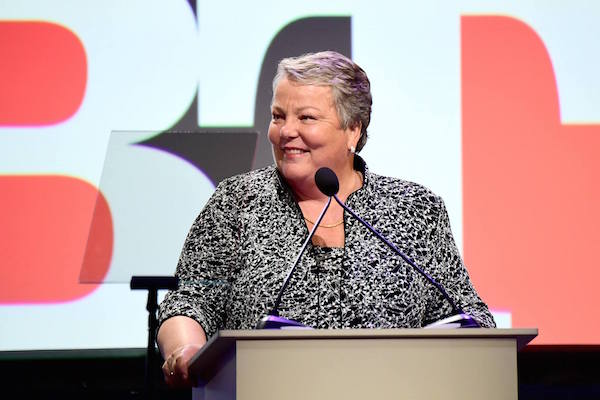
Lorri Jean speaks at LA LGBT Center gala at Beverly Hilton Hotel Sept. 23, 2017 (Photo by Karen Ocamb)
Center CEO Lorri Jean echoed that theme in her keynote address. “Tonight’s gathering is,” said Jean, “a reflection of the times. To put it in Tweet language, our country is now led by a lying sociopath. This has prompted an uprising by an unprecedented coalition of people who are concerned about the fate of our nation. People of every kind and every party who care deeply about building America’s well-being and fostering the human potential available to all of us, regardless of factors that should never be used to divide us, like sexual orientation and gender identity, race, immigration status.”
The Center has called Trump’s decision to end the Deferred Action for Childhood Arrivals (DACA) program “un-American.” It’s no joke. While Trump talks to “Chuck and Nancy”—Senate Minority Leader Chuck Schumer and House Minority Leader Nancy Pelosi—about support for the DREAM Act, the Washington Blade’s Michael K. Lavers reports that DREAMers are already being deported. Andrea Ayala, the executive director of Espacios de Mujeres Lesbianas por la Diversidad (ESMULES) in El Salvador confirms to Lavers that a legally married gay couple with a child from Bedford, Virginia, both DACA recipients, were deported to El Salvador. One of the men was brought to the U.S. when he was 6-months-old.
Jean, who usually stokes the Center gala crowd with righteous outrage, changed direction Saturday night. “Of course, it never hurts to get fired up so long as our anger is properly directed,” she said. “But getting fired up isn’t all we need. We need to be together at gatherings like this. We need to be reminded that we are part of a large majority and that despite what it may seem, this Administration and its policies are actually supported by the fewest Americans since political polling began. We need to enjoy and be grateful for and find strength in each other because we are among those still working hard to build a more inclusive, kinder, better future regardless of who may temporarily stand in our way.”
Three fundamental truths are at the heart of this coalition: 1) “We are a humane people,” Jean said. “That elemental character doesn’t change simply because a new Administration is focused on policies that are the antithesis of humanity and caring;” 2) “We are a moral people….We know that discrimination and hatred and selfishness are wrong. Love and equity and generosity of spirit are right… We must set and demand a different, more uplifting example,” especially from elected officials; 3) “We are a determined people. All of the LGBT people in the room, all of the women and people of color in the room, all of the Jews and Muslims and immigrants in the room, we are part of one or more communities that have suffered grave injustices throughout history and continuing to today. Yet, we have persevered. And increasingly we have prevailed.”
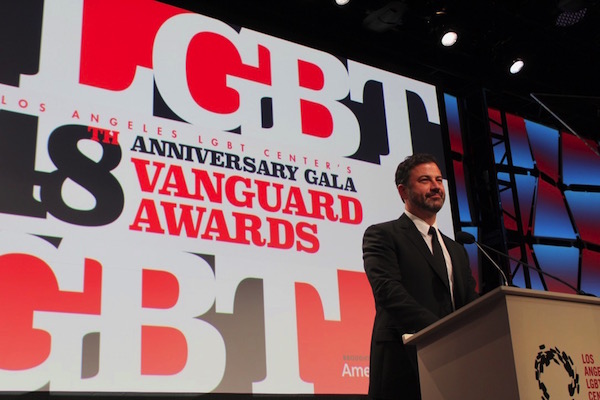
Jimmy Kimmel hosted the Los Angeles LGBT Center’s gala, Sept 23, 2017 (Photo by Karen Ocamb)
But change only happens when people make it happen, Jean said. “We must use our humanity, our morality and our determination not only to resist, but to continue actively building the well-being of our community and our nation.” And, she said, “for the next 3½ years it is our duty, our obligation, to do much more than simply hunker down and weather the storm. We must BE the storm!”
“Obviously this has been a very interesting week,” Kimmel said to much laughter after receiving a thunderous standing ovation.
“It seems very fitting that we are here tonight because you are committed to improving the health and safety and welfare of these teenagers at the LA LGBT Center,” Kimmel said after a video featuring an LGBT homeless African American youth. “Obviously they are relying on you for help because we don’t necessarily get it from out government.”
The gala raised more than $1 million for those Center services, says Chief Marketing Officer Jim Key, who is leaving in late October for another top marketing job after 17 years of service to the Center.
Kimmel became an accidental activist last May after a heart defect was found in his newborn son. His emotional remarks on his show, ABC’s Jimmy Kimmel Live, went viral. He cried, explaining the need for coverage for pre-existing conditions, as his son Billy now has. No parent should be faced with the heartbreak of not being able to afford help for their child, he said. Even Republicans trying to repeal Obamacare conceded that they had to pass the “Jimmy Kimmel test,” said GOP repeal bill co-author Sen. Bill Cassidy of Louisiana. After details of the bill were revealed, Kimmel said Cassidy “lied to my face.”
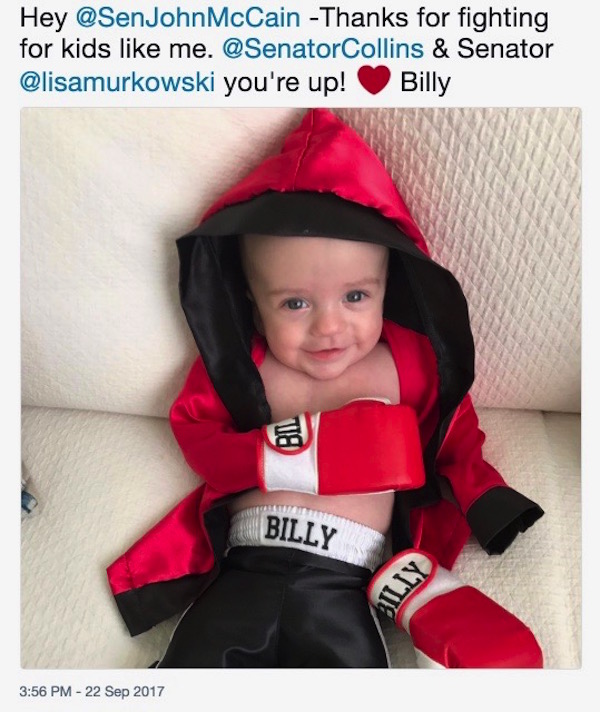
Billy Kimmel.
By Monday, the Graham-Cassidy repeal bill seemed dead, with Sens. Ron Paul, John McCain and Susan Collins pledging to vote no if the bill makes it to the Senate floor. “We are in your debt,” Kimmel tweeted to Collins.
Kimmel told a Center video crew that he actually “crashed” the gala because “I care more about other people than other people care about other people. You know, I care deeply so I go out and I do things, whether I’m invited or not.” He cares about the Center because of LGBT youth, who “need a little extra help.”
MSNBC host Lawrence O’Donnell told the crowd of Kimmel put his job at risk. “Jimmy Kimmel has done something he did not have to do,” O’Donnell said. “Traditionally, in Jimmy’s sector of show business, it’s considered very risky. I am sure there were—and maybe still are— millions of Trump voters who watch him. He gave those voters a difficult decision to make this week with their affections. He took that risk. And that is a brave act.”
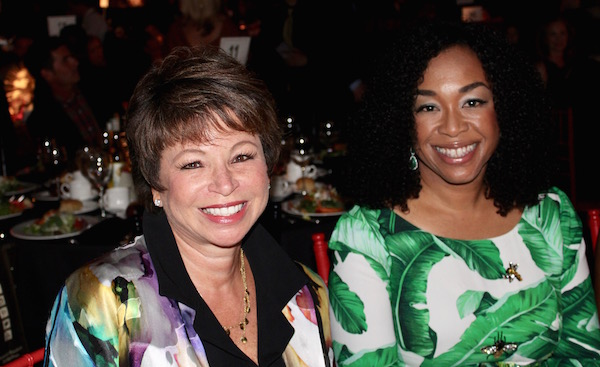
Valerie Jarrett and Shonda Rhimes (Photo by Karen Ocamb)
Jarrett, recipient of the Rand Schrader Distinguished Achievement Award, was introduced by her close friend and television producing powerhouse, Shronda Rhimes. “I like to think that Valerie came with hope to the White House and she left us with change,” she said.
In an exclusive interview with the Los Angeles Blade, Jarrett talked about the blow being experienced by so many, especially millennials who had come to take all the Obama progress for granted. “Well, this is the challenge. You can never take equal rights for granted. You have to constantly reinforce their importance. And we can never afford to become complacent. It is a real blow, particularly to young people who grew up with President Obama fighting on their behalf,” Jarrett says. “But part of the lesson here is that we all have a responsibility, a collective and an individual responsibility, to fight for what is just and what is right.”
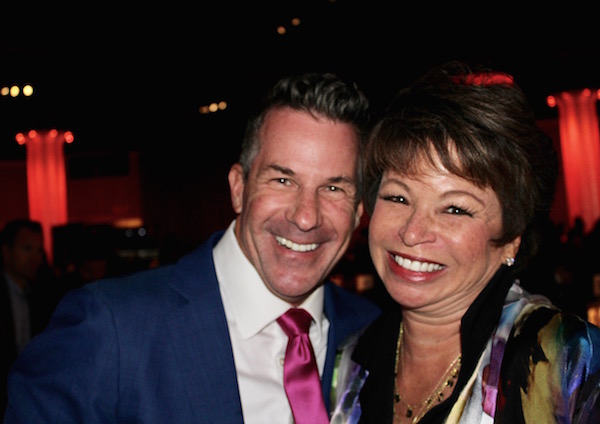
Jeremy Bernard and Valerie Jarrett (Photo by Karen Ocamb)
Jarrett had a chance to reunite briefly with Jeremy Bernard, a former member of ANGLE and Obama’s appointee as the first gay Social Secretary at the White House.
Jarrett took the stage with a breezy lightness that belies her powerful accomplishments.
“I accept this award on behalf of so many people in the Obama administration who fought and who pushed and who put their shoulder on that arc of the moral universe—with your help—towards justice,” she said. “And we know we’re not done. We know we’re in challenging times. I’m so happy to have Jimmy Kimmel here. Drop the mic for you!”
Jarrett also gave props to Lawrence O’Donnell, who has been weathering criticism for a temper tantrum. Her nod seemed to push the clouds away, in recognition for his tough job. “Lawrence goes on TV every night—the media is being attacked and it’s not easy to stand up,” she said. “Until you decide you know what, I’m standing up for what I believe in. And that’s what all of you are doing. And when you think about the young people, our future—the fact that you are touching those lives and helping them grow, to love themselves and to love each other means that love truly does trump hate.”
Vanguard Award recipient Ariel Emanuel, Co-CEO of WME | IMG, introduced by artist Mark Bradford (who ArtNet calls “our Jackson Pollock” ), shared how his family inculcated his values.
“My Mom’s the one who taught me—and my brothers—that there’s no excuses when it comes to working hard and doing the right thing. She’s the one who taught me that thinking differently is a virtue, not a problem. Those values led my Mom to march for civil rights,” he said, and his pediatrician father to get Chicago to deal with the lead paint poisoning kids.
“My parents taught me that when you look out at the world and you see something wrong… even if you think it doesn’t affect you, it does affect you. And you can—and you should—do something about it,” he said, a lesson that “took a while to sink in” as he struggled with dyslexia and ADHD.
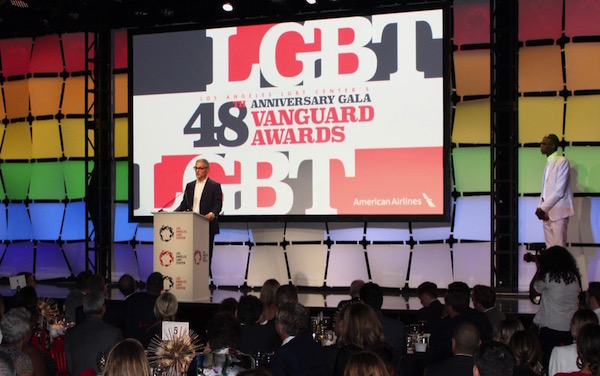
Ari Emanuel with Mark Bradford watching (Photo by Karen Ocamb)
When Emanuel was a teenager, his cousin Gary moved in with the family, not an unusual in their open house. Eventually, he realized his beloved cousin was gay. They lost touch when Gary moved to Boston.
“Then in the late 1980s, Gary got sick. Soon there were hospital visits. A lot of whispering and a lot of pills. Before long it was clear that he wasn’t going to make it,” said Emanuel to a hushed ballroom.
The last time they were in public together was at Bill Clinton’s 1993 Inauguration. “Gary dressed in a floor length golden-brown fur coat. He threw himself into everything at that inauguration—enjoying the shows and the dinners. But it was hard for him to summon the energy. It was coming
close to the end.
“When Gary was in hospice, I spent many nights there to say goodbye. You know, the cruelty of AIDS in those days wasn’t just the suffering and the few therapies. It was the silence. The feeling that you just couldn’t talk civilly and maturely about the disease, because it was a source of shame—an embarrassment. It was either yelling—demanding attention for AIDS—or whispers and winks.
“Thankfully we’re a long way from those days now,” Emanuel said. “Not just in terms of preventing AIDS, but with advances in treatments and ending the stigma around HIV. There is still more to do, but in most places in this country, gay people no longer have to hide. And for a lot of that progress, we have organizations like this Center to thank.”
But, laws can only do so much. True equality means unconditional love. It means inclusion instead of isolation. It means potential instead of powerlessness. Gary needed to be able to look out and see a culture that looked like him, like young people do today.”
Emanuel blasted Trump and Vice President Mike Pence, “hacks” who are trying “to take us back to the past—to roll back the progress we’ve made as a country” such as re-imposing the transgender military ban.
“So no matter how much things have changed, my Mom’s advice still matters a lot: If you see something wrong, even if it doesn’t affect you directly, your voice matters—and your actions matter even more. You’ve got to act to do the right thing. Be an example for others to do the same. That’s what I try to do in my own life,” he said.
“OK, so people don’t come to my office for unconditional love,” Emanuel said to much laughter. “But the work that we do in the entertainment industry gives us a unique responsibility” and ability to share stories.
“I appreciate the chance you’ve given me tonight to share my story of Gary with all of you—to share the story of our relationship, of his struggle, and to reflect on the social progress he would be so excited and proud to see. I want to use this award to honor his memory,” Emanuel said. “And with that in mind,
I leave you with a promise. A promise to use my role to tell true stories of this community and of every community…A promise to speak up where I see injustice…And to never wait to do the right thing.”
In the chatter after the awards ceremony, Jarrett told the LA Blade that her heterosexual sister-in-law had died of AIDS so Emanuel sharing Gary’s story was a shared experience among the straights, as well as among the hundreds of LGBT folks in the room.
“For so many of us, our commitment to fighting AIDS comes from the heart,” Jarrett shared in a July 24, 2012 blog for the Huffington Post. “Every day, I carry with me the pain of watching the excruciating death of my sister-in-law, Julie, eighteen years ago. Julie went for months without being properly diagnosed because it simply never occurred to her doctor to check for HIV. By the time she was diagnosed, it was too late. Julie left behind a devastated husband and a five-year-old daughter, Tracy.”
It is on the nest woven from these shared heartfelt stories that a new coalition for compassion rests and from which a new phoenix on the wings of decency and humanity will fly.
Los Angeles
Advocates demand that trans youth be protected as cases are argued in Supreme Court
This week, LGBTQ+ advocates and legal experts spoke in support of trans youth as two Supreme Court cases challenge their rights and safety.

This Tuesday, the Supreme Court heard oral arguments regarding two cases about transgender girls in sports: Little v. Hecox and West Virginia v. B.P.J.
In 2020, Idaho Governor Brad Little signed into law HB 500, which bans transgender girls and women from participating in school sports. This affected the first case’s respondent: transgender student athlete Lindsay Hecox, who was barred from participating in the track and cross country teams as well as intramural soccer and running clubs.
In 2021, then-governor of West Virginia, Jim Justice, approved HB 3293, which enacts a similar ban. Becky Pepper-Jackson (B.P.J.), now an incoming high school student, opposed the discriminatory policy when it prevented her from joining her then-middle school’s cross country and track and field teams. Pepper-Jackson has also only undergone female puberty due to gender-affirming care, but West Virginia argues that its anti-transgender policies should be upheld because of her assigned sex at birth.
For LGBTQ+ advocates and allies, these cases illustrate the burden and harm transgender people face daily as their rights to privacy, dignity, care, and inclusion are constantly at risk of being eroded and stripped completely.
Experts also wonder if these cases could potentially reshape the Constitution’s Equal Protection Clause as well as the civil rights law, Title IX. The former prohibits discrimination on other factors aside from race, though governments have argued that certain “suspect classifications” can be looked at more closely through “heightened scrutiny.” The latter prohibits sex-based discrimination in federally-funded schools.
What is unfolding and how local advocates are informing change:
The fight ahead is weary, and experts are certain that the states involved will not concede their points. In a webinar organized yesterday by the Williams Institute, several LGBTQ+ policy experts, including Rutgers Law School professor and anti-discrimination scholar Katie Eyer, examined where these cases may be heading, as well as efforts to muddy the arguments.
“It seems possible that the court might try to sidestep that issue here by saying that these laws don’t target transgender people at all,” Eyer said. “I think for most people, this seems bananas: like an upside-down world. We all know these laws were about transgender people.”
Jenny Pizer, an attorney for the LGBTQ+ civil rights legal organization Lambda Legal and a co-counsel member for the B.P.J. case, affirmed this sentiment at a press conference organized Tuesday by Lambda Legal and AIDS Healthcare Foundation affinity group, FLUX. “They’ve gone to great lengths to say there’s no discrimination,” Pizer said. “[They’re arguing] it’s just technicalities or classifications.”
Eyer was one of three Equal Protections scholars who filed an amicus brief to be considered in the Supreme Court cases. An amicus brief is a legal document submitted by someone who is not involved directly in a case but who may offer additional perspectives and information that can inform the ruling process.
Eyer’s brief provided historical context that clarified the disadvantages of blanket sex-based policies. These types of laws, according to Eyer, uphold stereotypes over nuance, truth, and equal protection guidelines. For Pepper-Jackson, who has only undergone female puberty and who does not “benefit” from what dissidents define as a sex-based competitive “advantage,” the state should have provided her the ability to argue that she should have the same rights as other girls.
“Of course, the state hasn’t done that here,” Eyer said. “Under these precedents, the Supreme Court should invalidate the laws as applied to those trans girls who really don’t have a sex-based competitive advantage.”
Who are these bills protecting?
The states argue that their policies are merely “ensuring safety and fairness in girls’ sports.” But queer advocates understand that this is a veneer for the exclusion of transgender people from society. Forcing trans youth out of sports “does not protect anyone,” according to California LGBTQ Health and Human Services Network director Dannie Ceseňa, who spoke at Tuesday’s press conference.
“It encourages the scrutiny of children’s bodies. It fuels gender policing, and it creates hostile school environments — not safer ones,” said Ceseňa. “Our youth should not inherit a world that treats their existence as a threat.”
Transgender people are systemically disempowered
At yesterday’s webinar, Distinguished Visiting Scholar at the Williams Institute Andrew Flores discussed his own amicus brief in support of Pepper-Jackson. The brief highlights the need for “heightened judicial scrutiny” in Pepper-Jackson’s case because the majority of political processes “systemically fail” transgender people.
For example, the transgender community faces substantial barriers in exercising their voter rights because of voter identification laws and other policies that regulate and define identity. “Even being able to gain access to the franchise is a burden for transgender people,” Flores said. “The court does play an important role there. It can grant legitimacy to arguments…or at least [acknowledge] that these issues are more complicated than maybe how they’ll receive them.”
What’s next?
Experts are hesitant about where the cases stand. “Bottom line: I don’t know what the court is going to do in these cases. They may send them back down for further development,” Pizer said, who thinks future rulings will not shift more overarching policies regarding transgender rights. “I think they will probably decide based only on laws about sports, not laws more broadly about the rights of trans folks.”
But whatever is decided, the impacts will trickle down to everyone. While the cases deal specifically with anti-transgender policies, experts warn that LGBTQ+ issues have always been tied to racial, economic, and disability justice. “There’s this looming constitutional campaign to really undermine civil rights,” said Eyer. “That affects LGBTQ people. It affects people of color. It affects people with disabilities. It affects everybody, and it really is concerning.”
As transgender inclusion and safety are being argued on the largest legal stage, advocates are asking: “When are you going to step up?” They are also sending a direct message to transgender youth: “We see you, we believe in you, and we are fighting for you,” said Ceseňa. “You deserve joy, community, and care. You deserve a future that reflects who you are and not who anyone or any politician demands you to be. Trans youth deserve better.”
Kristie Song is a California Local News Fellow placed with the Los Angeles Blade. The California Local News Fellowship is a state-funded initiative to support and strengthen local news reporting. Learn more about it at fellowships.journalism.berkeley.edu/cafellows.
Los Angeles
AIDS Healthcare Foundation will celebrate its legacy of food relief at the New Year’s Rose Parade
This Thursday, AHF will march at the Rose Parade in celebration of its “Food for Health” program: an initiative that has fed community members in need for five years.

This Thursday, the AIDS Healthcare Foundation (AHF) will march in the highly-anticipated Rose Parade in Pasadena. AHF will present a Jack and the Beanstalk float with the titular character climbing amongst ginormous tomatoes, eggplants, strawberries, and tomato plants. It’s befitting of this year’s parade theme: “The Magic in Teamwork,” which celebrates the power of collective effort and unity.
The whimsical design also honors the organization’s “Food for Health” program, an initiative that began in 2021 to respond to food insecurity across the U.S. For nearly five years, “Food for Health” has hosted free food pantries and farmers’ markets, providing hot meals and fresh groceries nationally for families and veterans in need of food assistance.
“Food for Health” was also crucial in the wide-sweeping emergency response various nonprofits were trying to organize after the devastating Palisades and Eaton Fires in January. AHF’s program delivered over 75,000 hot meals to evacuees and Los Angeles Fire Department (LAFD) first responders.
The float also honors the individuals fueling these on-the-ground efforts, like Janet and Christy Lee, the sisters behind Altadena’s Fair Oaks Burger. For eight months after these major fires broke out, the Lee sisters worked closely with “Food for Health” to host free weekly farmers’ markets in the parking lot of their restaurant to support community members who had been displaced and impacted by the wildfires.
Both sisters will join fellow local advocates and leaders like labor activist Dolores Huerta, LAFD Captain Thomas ‘Kit’ Kitahata, Champions of Caring Connections executive director Bettye Randle, and “Food for Health” directors Carlos Marroquin and Tara O’Callaghan as riders on the AHF float.
The Rose Parade begins at 8 a.m. on Thursday morning, marching through 5 miles of Colorado Blvd. Now in its 137th year, the parade’s inaugural event was held in 1890 and continues to delight local residents and usher in the new year with illustrious musical performances and grand floats. More information about tickets and parade guidelines can be found on Pasadena’s Tournament of Roses website.
Kristie Song is a California Local News Fellow placed with the Los Angeles Blade. The California Local News Fellowship is a state-funded initiative to support and strengthen local news reporting. Learn more about it at fellowships.journalism.berkeley.edu/cafellows.
Los Angeles
Recent L.A. County report reveals record number of hate crimes against transgender and nonbinary community members
The county’s Commission on Human Relations (LACCHR) released its annual hate crime analysis, revealing a rising violence against LGBTQ+ Angelinos.

Last Thursday, Los Angeles County’s Commission on Human Relations (LACCHR) released its 2024 Hate Crime Report, which analyzes data compiled from over 100 reporting groups, including local law enforcement agencies, educational institutions, and community-based organizations like the TransLatin@ Coalition. In its 45-year history of compiling these reports, the LACCHR recorded an “unprecedented” amount of hate crimes in this most recent analysis.
The report states that there were 102 anti-transgender crimes, “the largest number ever documented in this report.” 95% of these reported incidents were violent.
Part of the reason for this increase in reported crimes is the expanding outreach LACCHR is trying to create with partner organizations, ensuring that queer community members feel increasingly safe in reporting crimes that have been committed against them. These “grassroots efforts” have proven invaluable in building community trust, according to Dr. Monica Lomeli, who leads the production of LACCHR’s annual hate crime report.
“For the LGBTQ community, [there’s] a history of not being heard, not being believed or being misgendered,” Lomeli told the Blade. “I remember us working with a lot of different law enforcement agencies [and] victims would tell us: ‘They keep misgendering me. They don’t believe me. They keep having me make different reports.”
Lomeli stresses that, for those who feel unsafe reporting hate crimes to law enforcement agents, there are other options. One of these pathways is the commission’s community-centered initiative and reporting system, LA vs Hate, which allows people to report hate crimes and access resources like multilingual reporting guides. There is also 211 LA, a program funded by the commission that provides free, confidential support in 140 languages.
The report is instrumental to the formation of initiatives focused on queer safety and is also a resource to various LGBTQ+ organizations as they track violence committed against their community members. But the collection of this data has not been smooth, especially in this current administration.
Lomeli explained that, earlier this year, the now-defunct Department of Government Efficiency (DOGE) reached out to various human rights organizations, including the LACCHR, and was aiming to gain access to and shut down the commission’s hate crime database. “There was an attempt to bring down our data,” said Lomeli, who described these attempts as an infringement on the general public’s ability to access the report’s findings.
Moving forward, the commission’s Network Against Hate Crime, which hosts quarterly meetings with leaders from law enforcement agencies, advocacy groups, educational institutions, and social services providers, will hold a briefing on the report and discuss collaborative solutions to support community members.
Lomeli hopes to bring LGBTQ+ issues to the “forefront” of one of these upcoming meetings, given the high number of hate crimes committed against queer community members that were highlighted in the report. LA vs Hate will also continue to host campaigns, marketing efforts, and awareness events to promote the equitable treatment and safe existence of queer and other marginalized Angelinos.
Kristie Song is a California Local News Fellow placed with the Los Angeles Blade. The California Local News Fellowship is a state-funded initiative to support and strengthen local news reporting. Learn more about it at fellowships.journalism.berkeley.edu/cafellows.
Los Angeles
LGBTQ+ community calls out Radio Korea over host’s homophobic comments; station acknowledges but skirts accountability
On Nov. 3rd, Radio Korea host Julie An claimed that “gay people began the spread of AIDS” on a talk show broadcast by the station.
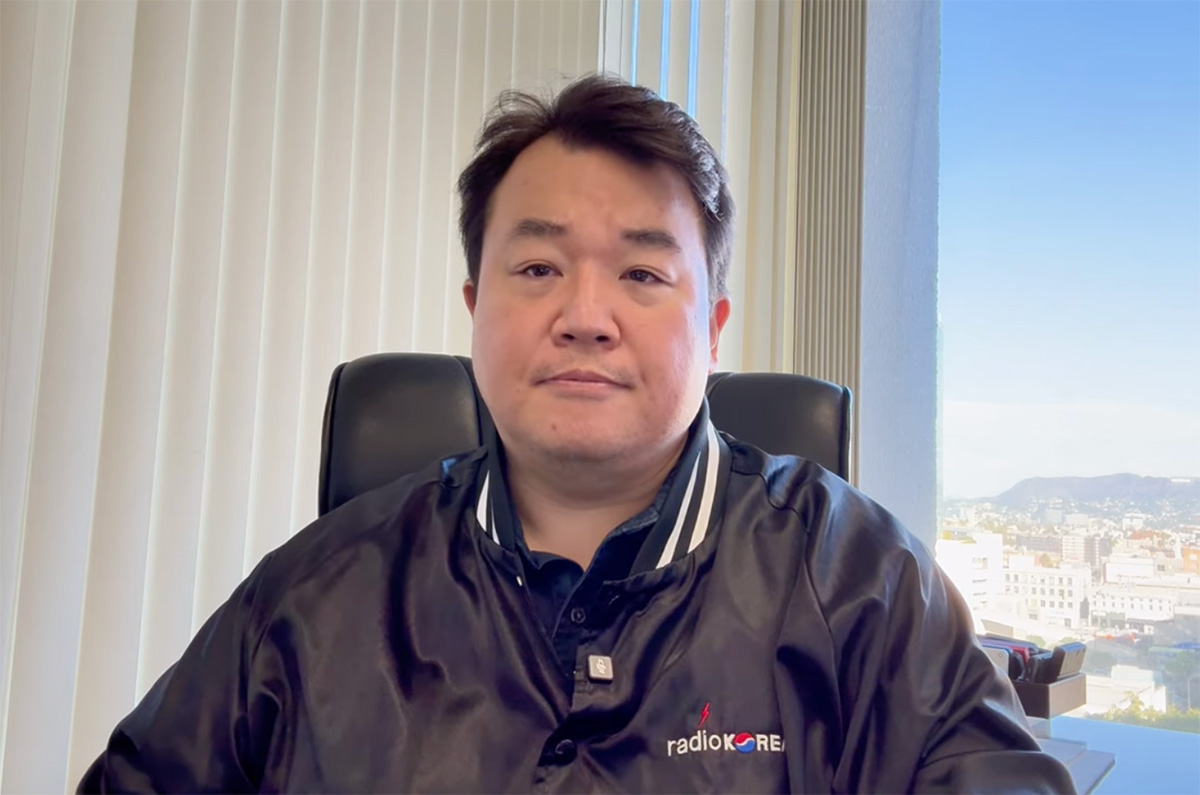
On Monday, Nov. 3rd, Radio Korea aired its regular morning talk show program, where one of its hosts, Julie An, discussed her lack of support for the LGBTQ+ community, citing her religious beliefs. She also went on to comment that gay people spread HIV and AIDS, and that conversation therapy — which has been linked to PTSD, suicidality, and depression — is a viable practice. Clips of this have since been taken down.
Radio Korea offers Korean language programming to engage local Korean American and Korean immigrant community members. Its reach is broad, as Los Angeles is home to the largest Korean population in the U.S, with over 300,000 residents. As An’s words echoed through the station’s airwaves, queer Korean community members took to social media to voice their concern, hurt, and anger.
In a now-deleted Instagram post, attorney, activist, and former congressional candidate David Yung Ho Kim demanded accountability from the station. Writer and entertainer Nathan Ramos-Park made videos calling out Radio Korea and An, stating that her comments “embolden” people with misinformation, which has the ability to perpetuate “violence against queer people.”
Community health professional Gavin Kwon also worries about how comments like An’s increase stigma within the Korean immigrant community, which could lead to increased discrimination against queer people and their willingness to seek health care.
Kwon, who works at a local clinic in Koreatown, told the Blade that comments like An’s prescribe being gay or queer as a “moral failure,” and that this commonly-held belief within the Korean immigrant community, particularly in older generations, strengthens the reticence and avoidance clients hold onto when asked about their gender or sexual orientation.
“When you stigmatize a group, people don’t avoid the disease — they avoid care,” Kwon explained. “They avoid getting tested, avoid disclosing their status, and avoid talking openly with providers. Stigma pushes people into silence, and silence is the worst possible environment for managing any infectious disease.”
For weeks, Radio Korea did not offer a direct response to the public criticism. Its Instagram feed continued to be updated with shorts, featuring clips of its various hosts — including An.
On Friday, Radio Korea CEO Michael Kim released an official statement on the station’s YouTube page. In this video, Kim stated that An’s comments “included factual inaccuracies” and that the station “does not endorse or share the personal opinions expressed by individual hosts.” Kim also stated that Radio Korea “welcomes members of the LGBT community to share their perspectives” in order to deepen understanding through dialogue.
Afterwards, Kim continued that though he acknowledges the “pain” felt by queer community members, he concluded: “I don’t think Radio Korea needs to apologize for what was said any more than Netflix should apologize for what Dave Chappelle says, or any more than Instagram or TikTok should apologize for what people say on their platforms.”
Kim then offered a justification that An’s statements were “not part of a news report,” and that he was “disappointed” that David Yung Ho Kim, specifically, had been vocal about An’s comments. Kim stated that he was the first person to interview David in 2020 during his congressional campaign, and that he had provided the candidate a platform and opportunity to educate listeners about politics.
“After all these years, the support Radio Korea has given him,” said Kim, “the support I personally gave him, even the support from other Radio Korea members who donated or even volunteered for him — he dishonestly tried to portray Radio Korea as being an anti-gay organization.”
Kim went on to criticize David’s purported “hurry to condemn others,” and also questioned if David has disowned his father, who he states is a pastor. “What kind of person is David Kim, and is this the kind of person we want in Congress?” Kim asked viewers, noting that Koreatown is “only about three miles from Hollywood, and some people just like to perform.”
At the end of the video, Kim stated that his duty is to guard the legacy of the station. “My responsibility is to protect what was built before me and ensure that Radio Korea continues serving this community long after today’s momentary controversies disappear,” Kim said.
For community members and advocates, this response was unsatisfactory. “The overall tone of the statement felt more defensive than accountable,” Kwon wrote to the Blade. “Instead of a sincere apology to the LGBTQ+ community that was harmed, the message shifts into personal grievances, political dynamics, and side explanations that don’t belong in an official response.”
Kim’s portrayal of the criticism and calls to action by community members as a “momentary controversy” paints a clearer picture of the station’s stance — that the hurt felt and expressed by its queer community members is something that will simply pass until it is forgotten. An continues to be platformed at Radio Korea, and was posted on the station’s social media channels as recently as yesterday. The station has not outlined any other action since Kim’s statement.
Kristie Song is a California Local News Fellow placed with the Los Angeles Blade. The California Local News Fellowship is a state-funded initiative to support and strengthen local news reporting. Learn more about it at fellowships.journalism.berkeley.edu/cafellows.
Los Angeles
Forgetting queer pioneer Morris Kight is “impossible”: Advocates and friends share stories at remembrance
On Saturday, Nov. 22nd, Kight’s ashes were interred at Hollywood Forever Cemetery.
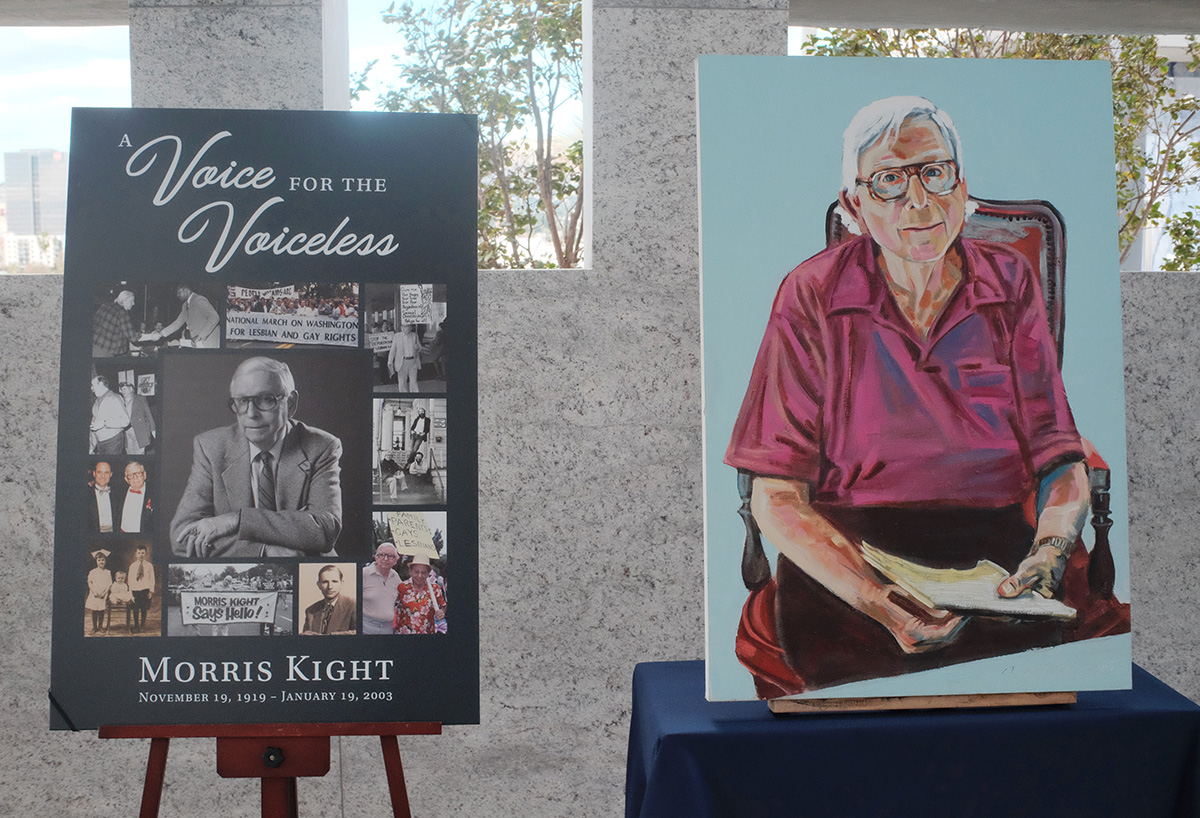
Over 50 people made their way to the rooftop chapel at Hollywood Forever Cemetery’s Gower Mausoleum on Saturday afternoon, taking in sweeping views of the city as a gentle wind began to envelop the space — a wind that some thought signaled the presence of Morris Kight. Hosted by local nonprofit AIDS Healthcare Foundation (AHF), this reception provided longtime friends, fellow activists, and anyone else impacted by Kight’s legacy with the opportunity to share some of their most memorable stories about the LGBTQ+ vanguard.
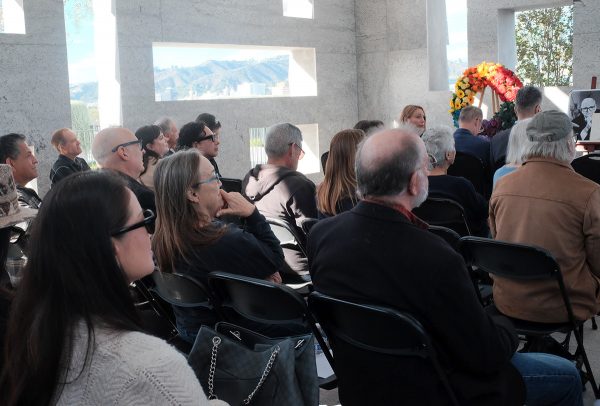
Kight died on January 19, 2003, after decades of leading peaceful, bold, and outspoken action against oppressive systems that targeted marginalized communities. As Congresswoman Maxine Waters declared at the remembrance event: “You have to be a hell of somebody to be memorialized 22 years after.”
Kight co-founded the Los Angeles LGBT Center in 1969, first known as the Gay Community Services Center, where so many queer youth and adults found the courage and empowerment to seek education, resources, and comfort. It became the place where they could fully embrace themselves.
At 19, AHF president Michael Weinstein found himself at the front steps of the Center, afraid but compelled. This is where his and Kight’s lives would intertwine, setting him on his own path of liberatory leadership. This first encounter and relationship “cemented” his identity, Weinstein told the crowd, after an arduous search for belonging and internal understanding.
The impact Kight had on Weinstein and innumerable other queer folks was not just a consequence of his work, but the purpose for it all. “We were his payment. We were his reward,” said Miki Jackson, Kight’s longtime friend and another instrumental voice in early LGBTQ+ movements. “Morris cared that we were loud enough, we were out enough, we were visible enough that a child in Kansas in elementary school would know about it. He cared about where people were wounded the most.”
Kight projected his voice in hopes it would reach those who were silenced, becoming the face of several important movements, including the Gay Liberation Front. He raised money for people with AIDS, co-founded the Stonewall Democratic Club, and pushed for L.A.’s first pride parade in 1970 — unabashedly fighting for the visibility of LGBTQ+ people as they were met with societal violence and rejection.
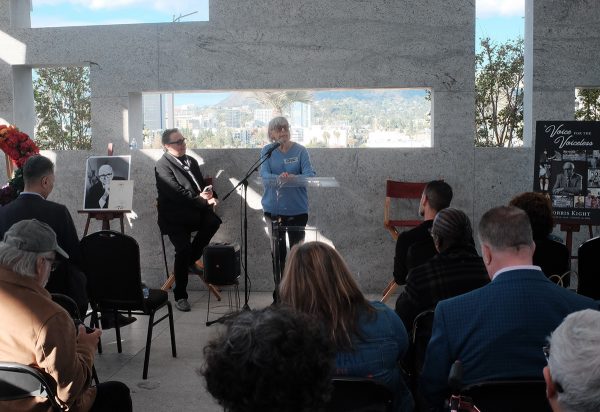
“The idea of forgetting a Morris Kight is basically impossible,” said Terry DeCrescenzo, one of the founders of the Gay Academic Union. She recounted fond memories with Kight, including a story tied with her roots of protesting. Together, they blocked the streets of Sunset and Larrabee and sang the civil rights anthem “We shall overcome.” At first, DeCrescenzo was in disbelief. “I thought, ‘I went to Catholic school for 17 years to sit on the sidewalk singing We shall overcome?’ And the answer is yes. He showed me a way of doing things — of approaching life — that I didn’t dream I was capable of. So I thank you, Morris. I love you. I miss you.”
Kight’s ashes have been officially interred at Hollywood Forever Cemetery, granting him a final resting place. In life, he built sites of belonging for queer people, and today, this ground joins a tender catalog of spaces that contains a trace of what his loved ones hope he is remembered for: the fierce kindness with which he led his life. His endless stories. His desire to be with and fight for the people he loved.
Saturday’s remembrance event also offered a moment of deep reflection for the future of local queer activism. “We’re what we have left,” said Jackson, a queer elder who marched alongside Kight in the country’s early days of LGBTQ+ protesting — and who paved a path for younger advocates like Congressman and Equality Caucus Chair Mark Takano to continue the fight. “May we honor Morris by carrying his fire forward until every LGBTQ+ person in this country can live safely, open and unafraid,” said Takano.
Kristie Song is a California Local News Fellow placed with the Los Angeles Blade. The California Local News Fellowship is a state-funded initiative to support and strengthen local news reporting. Learn more about it at fellowships.journalism.berkeley.edu/cafellows.
Los Angeles
The Los Angeles LGBT Center has reopened and upgraded its community tech hub
The David Bohnett CyberCenter provides free access to important tech resources for LGBTQ+ community members.
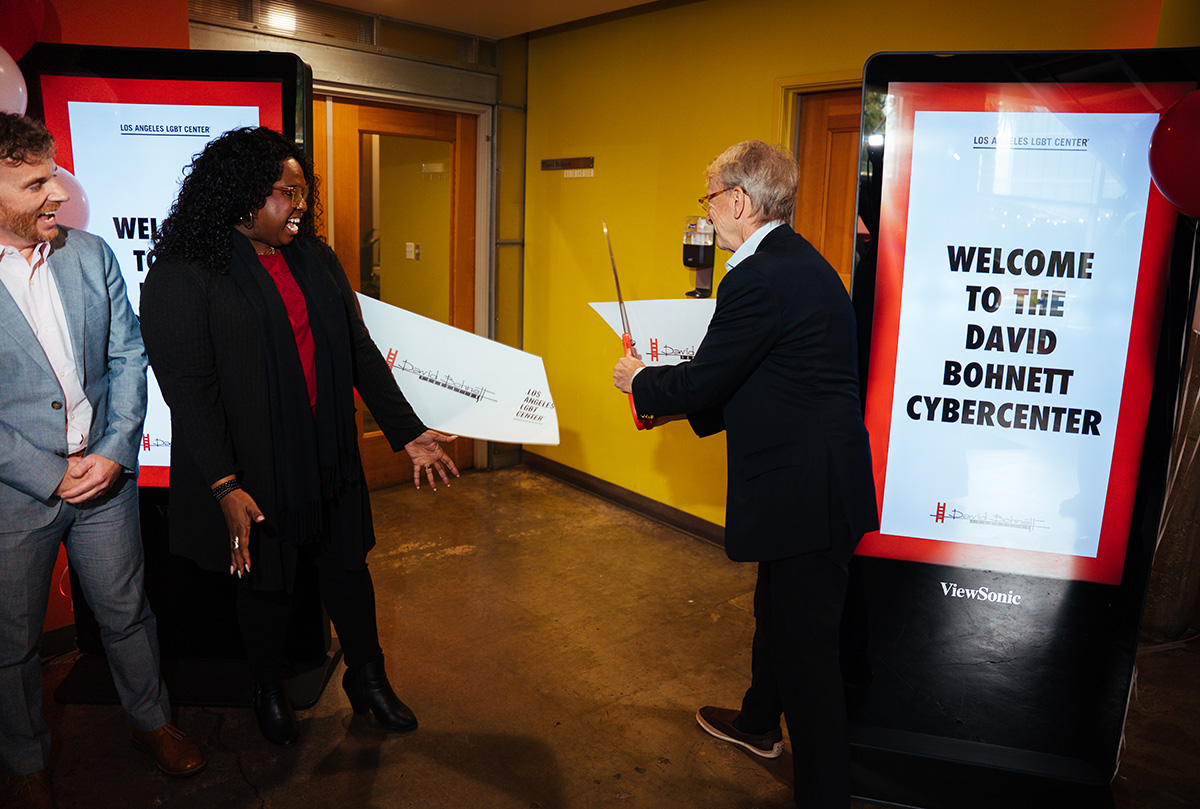
On Thursday, community leaders and advocates gathered at the Los Angeles LGBT Center for a joyous ribbon-cutting event that ushered in the organization’s revamped tech hub. For 27 years, the organization’s David Bohnett CyberCenter has provided local residents a safe space to utilize computers, printers, scanners, and attend workshop opportunities to build their tech literacy skills, stay connected, discover joy, and research important opportunities.
Here, individuals can safely surf the web, complete online benefits and services forms, apply for jobs, as well as make progress towards educational programs. It’s a safe space where LGBTQ+ community members can reliably use technology that can provide them with vital avenues into improving and living their lives.
The CyberCenter is funded by the David Bohnett Foundation, which provides grants to various LGBTQ+ initiatives and social programs nationally in order to improve equity for different marginalized communities. In 1998, the foundation established its first tech hub at the Los Angeles LGBT Center, so that queer community members would not be shut away as technological advancements made online access increasingly necessary. “The idea was simple but urgent,” Bohnett said at yesterday’s ceremony. “[It was meant] to ensure that LGBTQ+ people had access to the technology that could open doors to education, employment, and connection.”
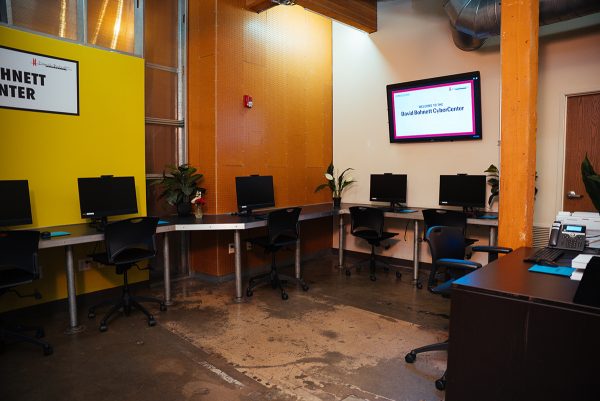
Yesterday, this CyberCenter’s updated facilities were welcomed with warm applause, cheer, and a celebratory banner that was cut by Bohnett himself. It marked an evolving growth towards the foundation and the Center’s shared commitment to the hub’s initial promise: to guarantee equitable technological access to the county’s queer residents.
“Our community members regularly share how missing even one piece of access—a computer, a quiet place to work, a stable connection—can stall their progress,” said Sydney Rogers, senior program manager at the Trans Wellness Center. “For so many, technology isn’t just a tool—it’s the gateway to opportunity. Résumés, job searches, online trainings, interview prep—all of it depends on having access to reliable equipment and an environment where people feel safe and supported.”
For Bohnett, what began as a room with a “handful of computers” has grown into over 60 CyberCenters nationwide — and they are all “rooted in the belief that digital access is not a luxury, but a lifeline,” said Bohnett. “Every time I’m back here, I’m reminded that the Los Angeles LGBT Center was the first to bring that vision to life.”
The David Bohnett CyberCenter is open from Tuesdays to Thursdays, from 10 a.m. to 1 p.m., and from 2-5 p.m. More information about its location and services can be found here.
Los Angeles
This queer, Latine-led organization is protecting residents against SNAP cuts and immigration raids
The weeks-long delay in SNAP benefits left food insecure residents stranded. Community centers like Mi Centro worked to help them.
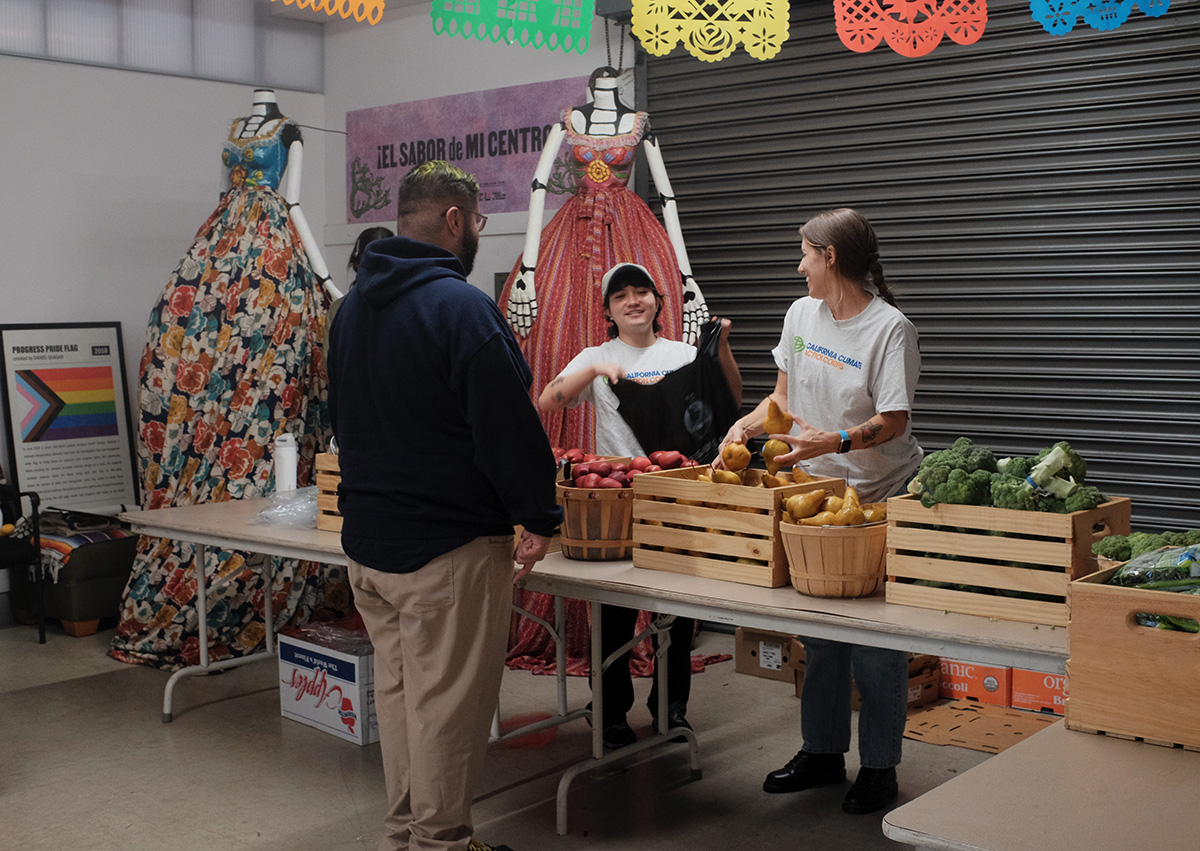
Light rain and mist loomed over the quiet Boyle Heights Neighborhood on Friday morning as residents made their way towards a free farmer’s market at Mi Centro, a community center on South Clarence Street. There, they were greeted with a warm“buenos días” by program coordinator Norma Sánchez and guided into an adjacent room with crates of fresh produce and a table with mental health resources.
Created in collaboration with team members from both the Los Angeles LGBT Center and the Latino Equality Alliance, Mi Centro doubles as a hub for information and resources as well as a sanctuary of respite and comfort for its Latine community members. It provides immigration services, legal clinics, housing rights panels, and a monthly free farmers’ market. This November, Mi Centro has organized an additional market with the support of collaborating organizations, including food justice ministry Seeds of Hope, to step up for community members after SNAP benefits were cut at the beginning of the month.
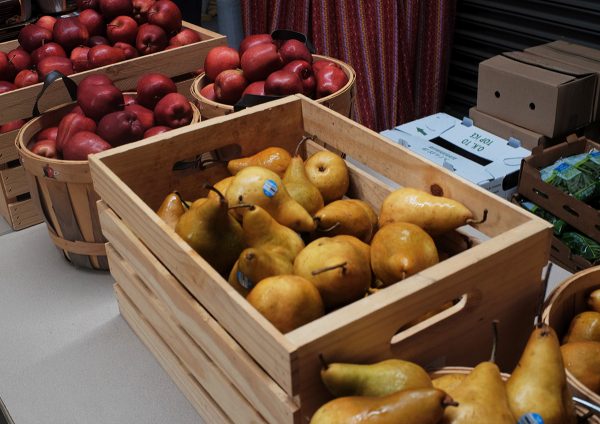
Combined with the increased presence of federal immigration agents in the county since June, this cut in essential funding has created additional strain for local Latine community members when it comes to accessing food and feeling safe when stepping outside. For staff members at Mi Centro, these issues impact the livelihoods and safety of the people and spaces most familiar and important to them. “This is the community where my family immigrated to,” Caín Andrade, Mi Centro’s program manager, told the Blade. “Now I feel like it’s not only my duty, but my pleasure and my privilege to come back to the same community and help.”
At Friday’s market, Andrade noted that it yielded one of the “biggest turnouts” despite the weather, and explained that Mi Centro has seen a steady increase in the need for food and resource assistance in the last couple of months. Several community members showed up to access groceries and look through the other resource tables at the market. One of these tables included information about benefits and insurance enrollment, and another included pamphlets from local health nonprofit QueensCare about free health screenings. All written materials were provided in both Spanish and English, and Sánchez made sure to speak with each resident about their needs.
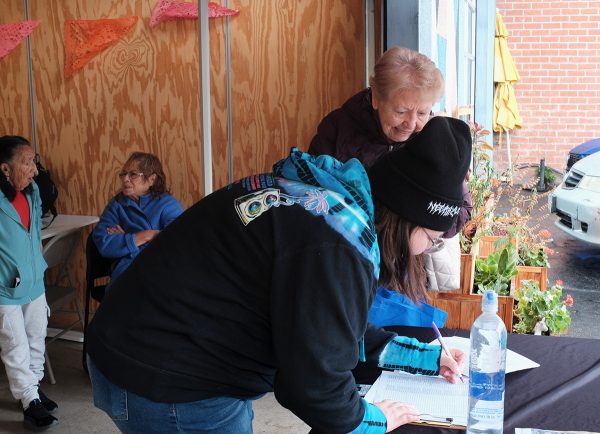
“We really curated Mi Centro as a community center where people can feel like they belong,” said Andrade. “[We] provide a space that feels a little bit more like home to them: that’s warm, that’s got flowers and art, a couch to sit on, and just have somebody that listens to you — somebody that can speak Spanish and give them the opportunity to articulate what they’re going through in their language. We can see the sighs of relief.”
Andrade also emphasizes the intergenerational teamwork that happens at Mi Centro: a synergy that is guided by “young, queer Latino community” voices that have been embedded within the neighborhood. Mi Centro’s queer staff are deeply shaped by these communities that have long been home to them — and they, in turn, are shaping these spaces to be more inclusive: where LGBTQ+ visibility is embraced and cherished.
With a team that “represents the entire rainbow,” residents see the advocates working to support them as “our kids, our nephews, our grandkids,” Andrade said. “We are equally protective of them. We want to make sure that they are being given access to everything that other communities might have easy access to.”
Mi Centro’s next free farmer’s market takes place on Friday, Nov. 21st. More information can be found here.
Los Angeles
LA Assessor Jeffrey Prang to be honored by Stonewall Democrats
Prang is among America’s longest-serving openly gay elected officials
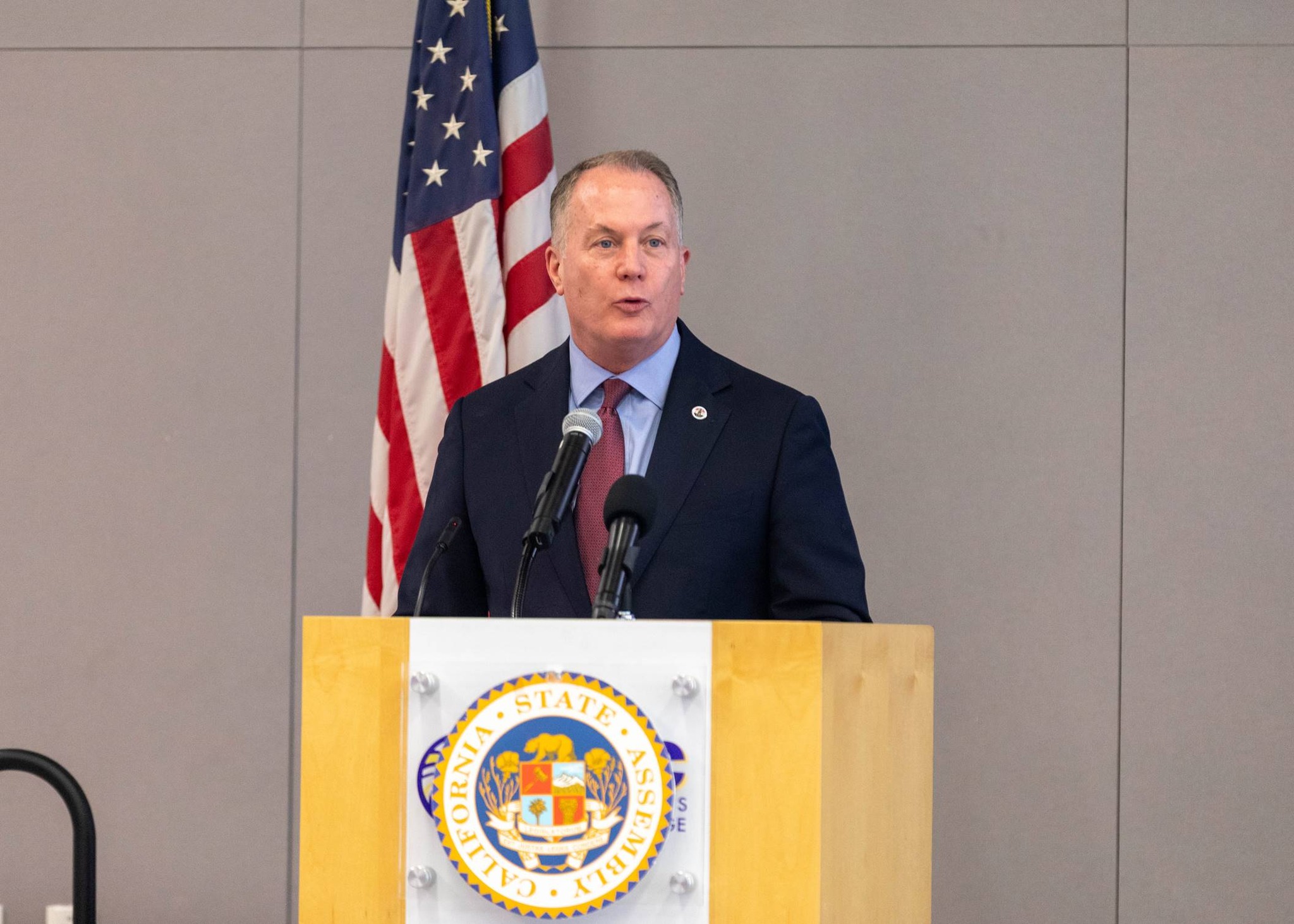
You may not be too familiar with LA County Assessor Jeffrey Prang. You’ve probably never heard of the office of the LA County Assessor, or you might only have a vague notion of what it does.
But with a career in city politics spanning nearly thirty years, he’s among the longest-serving openly gay elected officials in the United States, and for his work serving the people of Los Angeles and championing the rights of the city’s LGBTQ people, the Stonewall Democratic Club is honoring him at their 50th Anniversary Celebration and Awards Night Nov 15 at Beaches Tropicana in West Hollywood.
Prang moved to Los Angeles from his native Michigan after college in 1991, specifically seeking an opportunity to serve in politics as an openly gay man. In 1997, he was elected to the West Hollywood City Council, where he served for 18 years, including four stints as mayor.
“I was active in politics, but in Michigan at the time I left, you couldn’t really be out and involved in politics… My life was so compartmentalized. I had my straight friends, my gay friends, my political friends, and I couldn’t really mix and match those things,” he says.
“One of the things that was really impactful was as you drove down Santa Monica Boulevard and saw those rainbow flags placed there by the government in the median island. That really said, this is a place where you can be yourself. You don’t have to be afraid.”
One thing that’s changed over Prang’s time in office is West Hollywood’s uniqueness as a place of safety for the queer community.
“It used to be, you could only be out and gay and politically involved if you were from Silver Lake or from West Hollywood. The thought of being able to do that in Downey or Monterey Park or Pomona was foreign. But now we have LGBTQ centers, gay pride celebrations, and LGBT elected officials in all those jurisdictions, something that we wouldn’t have thought possible 40 years ago,” he says.
Prang’s jump to county politics is emblematic of that shift. In 2014, amid a scandal that brought down the previous county assessor, Prang threw his name in contention for the job, having worked in the assessor’s office already for the previous two years. He beat out eleven contenders in the election, won reelection in 2018 and 2022, and is seeking a fourth term next year.
To put those victories in perspective, at the time of his first election, Prang represented more people than any other openly gay elected official in the world.
Beyond his office, Prang has lent his experience with ballot box success to helping get more LGBT people elected through his work with the Stonewall Democrats and with a new organization he co-founded last year called the LA County LGBTQ Elected Officials Association (LACLEO).
LACLEO counts more than fifty members, including officials from all parts of the county, municipal and state legislators, and members of school boards, water boards, and city clerks.
“I assembled this group to collectively use our elected strength and influence to help impact policy in Sacramento and in Washington, DC, to take advantage of these elected leaders who have a bigger voice in government than the average person, and to train them and educate them to be better advocates on behalf of the issues that are important for us,” Prang says.
“I do believe as a senior high-level official I need to play a role and have an important voice in supporting our community,” he says.
Ok, but what is the LA County assessor, anyway?
“Nobody knows what the assessor is. 99% of people think I’m the guy who collects taxes,” Prang says.
The assessor makes sure that all properties in the county are properly recorded and fairly assessed so that taxes can be levied correctly. It’s a wonky job, but one that has a big impact on how the city raises money for programs.
And that wonkiness suits Prang just fine. While the job may seem unglamorous, he gleefully boasts about his work overhauling the office’s technology to improve customer service and efficiency, which he says is proving to be a role model for other county offices.
“I inherited this 1970s-era mainframe green screen DOS-based legacy system. And believe it or not, that’s the standard technology for most large government agencies. That’s why the DMV sucks. That’s why the tax collection system sucks. But I spent $130 million over almost 10 years to rebuild our system to a digitized cloud-based system,” Prang says.
“I think the fact that my program was so successful did give some impetus to the board funding the tax collector and the auditor-controller to update their system, which is 40 years behind where they need to be.”
More tangible impacts for everyday Angelenos include his outreach to promote tax savings programs for homeowners, seniors, and nonprofits, and a new college training program that gives students a pipeline to good jobs in the county.
As attacks on the queer community intensify from the federal government, Prang says the Stonewall Democrats are an important locus of organization and resistance, and he encourages anyone to get involved.
“It is still an important and relevant organization that provides opportunities for LGBTQ people to get involved, to have an impact on our government and our civic life. If you just wanna come and volunteer and donate your time, it provides that, if you really want to do more and have a bigger voice and move into areas of leadership, it provides an opportunity for that as well,” he says.
Los Angeles
SNAP benefits remain delayed — local leaders are creating their own solutions
Assemblymember Mark González has announced a $7.5 million partnership with the YMCA’s FeedLA food distribution program.
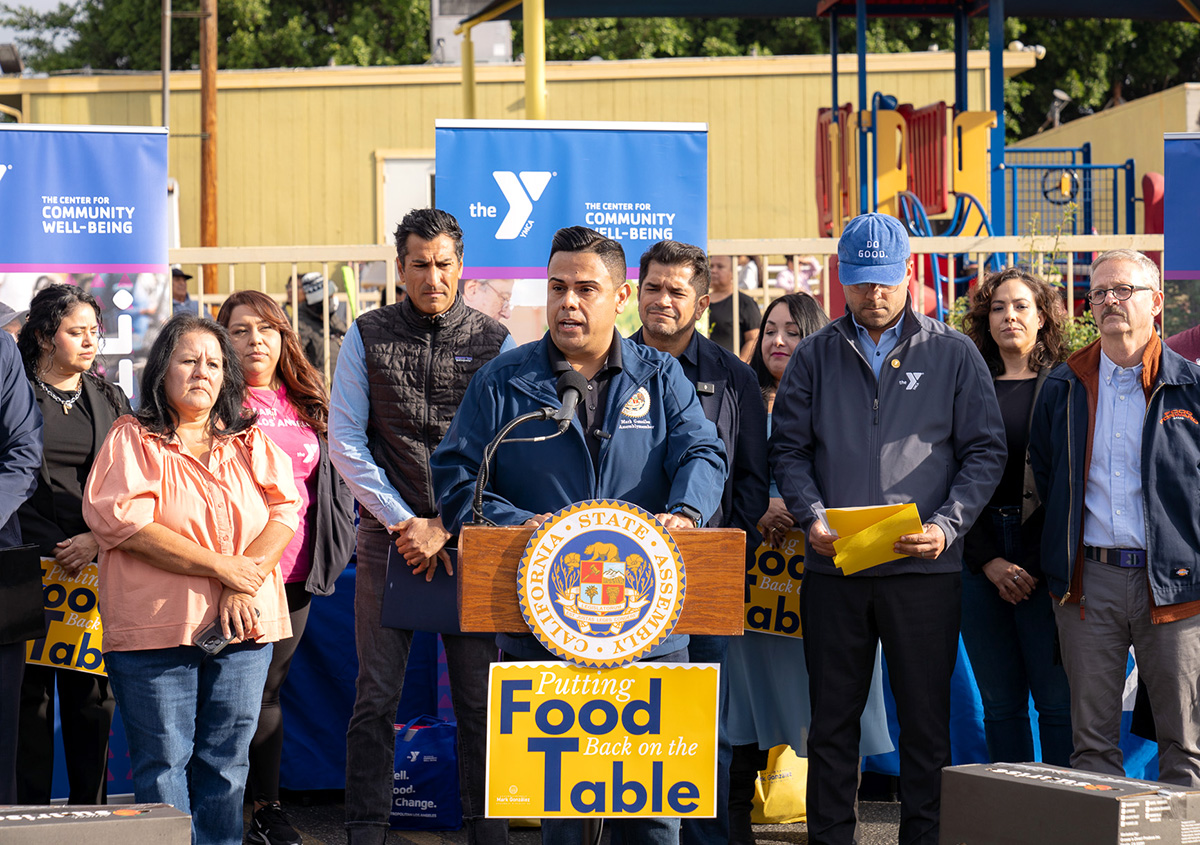
Today marks the 37th day of the current government shutdown, the longest witnessed in the country’s history. As a result, people who receive federal Supplemental Nutrition Assistance Program (SNAP) benefits have not received their monthly aid for November. In Los Angeles, over 1.5 million people rely on these funds to purchase groceries.
On Oct. 28th, Governor Gavin Newsom announced that California joined over 20 other states in suing the administration over its “unlawful refusal” to provide SNAP aid even though it has the funds to do so. Two federal judges ruled in favor of the lawsuit, though when and how much aid will be distributed remains inconclusive.
At a press briefing on Tuesday, White House press secretary Karoline Leavitt stated that the administration is “fully complying” with the court order. “The recipients of the SNAP benefits need to understand: it’s going to take some time to receive this money because the Democrats have forced the administration into a very untenable position,” Leavitt continued. “We are digging into a contingency fund that is supposed to be for emergencies, catastrophes, for war.”
On Wednesday morning, local leaders in Los Angeles held their own press conference at the Weingart East Los Angeles YMCA to denounce the administration’s inaction and to discuss alternative efforts that are trying to fill the gap as SNAP aid remains suspended. “We’re here today because the federal government has turned its back on millions of families, and we refuse to stay silent,” said District 54 Assemblymember Mark González. “This is more than a press conference. This is a plea for sanity, a demand for humanity, and a call to action…California is stepping up to do what Washington will not, and that’s to feed our people.”
Alongside a number of other local leaders and advocates, including Assemblymember Jesse Gabriel, Speaker of the California State Assembly Robert Rivas, Boyle Heights community leader Margarita “Mago” Amador, Congressman Jimmy Gomez, YMCA president Victor Dominguez, and Food Forward founder Rick Nahmias, González announced a partnership with the YMCA’s FeedLA program. $7.5 million has been secured to fund food distribution efforts across the county’s 29 YMCA sites.
Residents do not need to have a YMCA membership to take part. Resources like groceries, warm meals, and home deliveries will be available at various times throughout the week. There are currently no weekend distribution dates listed.
This announcement comes in the midst of other local efforts bolstering on-the-ground SNAP relief. On Tuesday, the Los Angeles County Board of Supervisors approved a motion that will strengthen the Office of Food Systems (OFS), a partnership between county leaders and local philanthropic organizations aiming to create equitable food systems for residents. The motion would establish deeper connections between OFS and all County departments, as well as strengthen state and federal food policy coordination.
The county has also funded a $10 million contract with the Los Angeles Regional Food Bank, which will allow the organization to purchase more produce and create additional pantry and food distribution pop-up sites.
For many, these solutions offer a temporary landing pad as they hold out for their benefits to be reinstated. “Food pantries are not just places where a bag of food is handed out. They are a bridge of hope for our most vulnerable communities,” said Amador, at Wednesday’s press conference. “When a family comes to a pantry, many times they don’t just bring an empty bag. They also bring worries, stress and [the] fear of not being able to feed their children. They leave with a bag of food [and] they take with them a bit of dignity, relief, and a feeling that they are not alone.”
Los Angeles
Queer communities will face disproportionate harm when SNAP ends
The Blade spoke with researchers, local leaders and food distribution organizers to discuss the impact on LGBTQ+ people
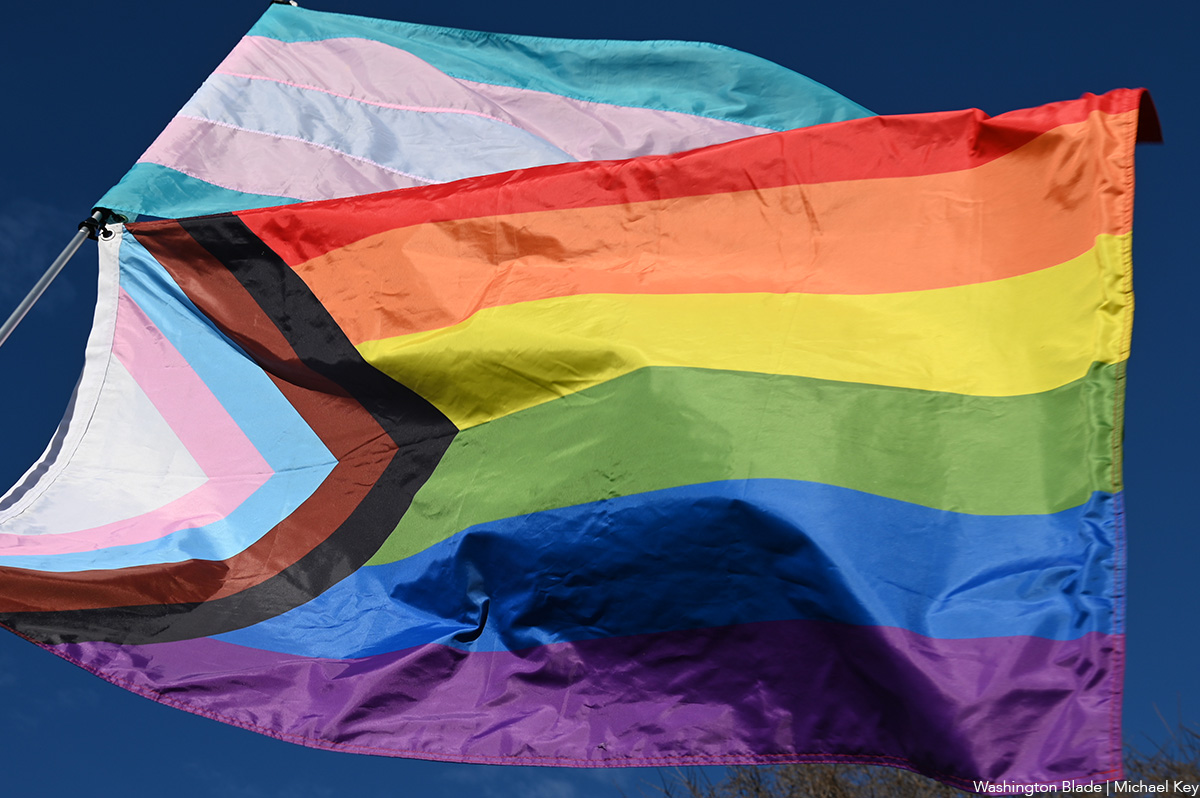
On Oct. 1st, the previous federal budget expired, and the government entered a shutdown after being unable to reach an agreement on how different government services would be funded moving forward. Namely, democratic officials are arguing for more affordable healthcare as well as a reversal of President Trump’s cuts to Medicaid and health agencies, as proposed in H.R. 1 — otherwise known as the “One Big Beautiful Bill Act.” Without a compromise that Trump will agree to, several essential federal services remain stalled.
Now, the federal Supplemental Nutrition Assistance Program (SNAP), formerly known as food stamps, will be indefinitely halted beginning Nov. 1st. This affects over 1.5 million Los Angeles residents who rely on CalFresh, the state’s equivalent of SNAP. BenefitsCal, the portal Californians can use to access and manage benefits that include food assistance, announced on Oct. 27th that “the U.S. Department of Agriculture (U.S.D.A.) is not sending money to states for November CalFresh (SNAP) benefits. This means your county cannot add money to your EBT card until federal funding is restored.”
For LGBTQ+ community members, this impact will be particularly damaging.
Over 665,000 LGBTQ+ adults live in Los Angeles County, and 32% of this population reported experiencing food insecurity from 2023 to 2024, according to data analysis completed by researchers at the Williams Institute. In comparison, 23% of non-LGBTQ+ adults reported experiencing food insecurity.
“I think it’s important to realize that many people who are on SNAP are either disabled and can’t work, or they’re caretaking for young children — and those tend to be the groups of people in the LGBTQ community,” Brad Sears, the Rand Schrader Distinguished Scholar of Law and Policy at the Williams Institute, told the Blade. “Over 60% of LGBTQ people on SNAP are disabled, and about 46% are raising children…There aren’t a lot of options for them in meeting their basic needs, [like] providing food for themselves and their families, besides SNAP benefits.”
How can LGBTQ+ community members access food assistance in November?
Sears pointed out how, in times of social struggle, queer communities have turned to each other for support. He states that it is important, now more than ever, for local organizations and food distribution programs to stand in solidarity with LGBTQ+ people — many of whom face barriers to seeking resources due to various factors like the fear of discrimination. “This is an important time to send that message that they are inclusive, that their services are inclusive, and that everyone, including LGBTQ people, are welcome to access their resources,” Sears told the Blade.
The Hollywood Food Coalition is one of these spaces. The organization rescues and redistributes food through a community exchange program, and also provides hundreds of dinners to community members every day of the year. “We are open to anyone hungry. We’re proud to serve many LGBTQ+ guests and to offer a welcoming space where everyone can share a meal and feel safe, seen, and cared for,” Linda Pianigiani, the organization’s interim director of development, told the Blade.
The Los Angeles LGBT Center is also partnering with food justice organization Seeds of Hope to provide more free farmers’ markets this upcoming month. For Giovanna Fischer, the Center’s chief equity officer, this is an opportunity to champion intersectional queer empowerment in the midst of the administration’s actions. For marginalized community members, including those who are trans, disabled, or immigrants, organizers are thinking about multidimensional approaches as they support community members through crises like the indefinite end to SNAP benefits.
“Now we’re looking at an issue [that can be] compounded three times simply because of who that person is and the experience that they have in their life,” Fischer told the Blade. “There’s no single-issue analysis of anything that’s coming up for our community, because we’re not living single-issue lives…How are we thinking through things in a layered way to ensure that people with these intersectional identities have access to the things that they need?”
How is the state and county responding?
On Tuesday, Governor Newsom announced that California is joining 20 other states in suing the administration for its “unlawful refusal” to continue funding SNAP. Los Angeles County Supervisor Lindsey Horvath also stated in a press release that the county is working to fund a $10 million contract with the Los Angeles Regional Food Bank to expand food purchasing capabilities and create more food assistance pop-up sites and community pantry locations.
L.A. Care Health Plan is also investing up to $5.4 million to fund countywide food security and distribution efforts, as well as provide aid to nonprofit organizations that distribute fresh produce.
The limitations we’re facing
While these efforts are instrumental in delivering necessary food aid in SNAP’s absence, Sears is worried about the long-term strain the suspension of federal food assistance will have on LGBTQ+ communities and the organizations trying to support them. “A number of state and local governments are going to try to temporarily fill the gap, but…the resources to do that will likely be overwhelmed without SNAP benefits,” Sears told the Blade. “Nonprofit organizations are already feeling the pressure of funding cuts from the Trump administration.”
Pilar Buelna, chief operations officer of the Hollywood Food Coalition, is seeing this pressure in real time. She notes that the increase in the need for local food assistance has been growing since the summer, and will only continue to grow with the quickly-approaching end to SNAP benefits. “Yesterday, actually, we ran out of food,” Buelna told the Blade, after the coalition gave out 300 meals but were still met with individuals in need of food. “We are concerned that the need is going to increase so much that we’re not going to be able to keep up…We are sending out a call to action to the community to donate food and funding. We need [these] to continue our operations.”
The Blade will be shadowing various food distribution programs and efforts throughout November to track the impact of the end of SNAP on queer Angelinos, and the community-led efforts being organized to support them.
-

 a&e features3 days ago
a&e features3 days agoVic Michaelis is a very important person
-
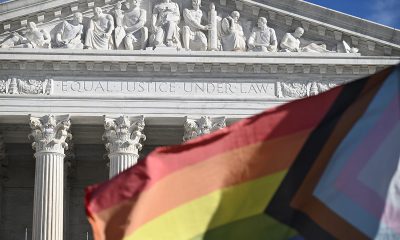
 U.S. Supreme Court5 days ago
U.S. Supreme Court5 days agoSupreme Court hears arguments in two critical cases on trans sports bans
-
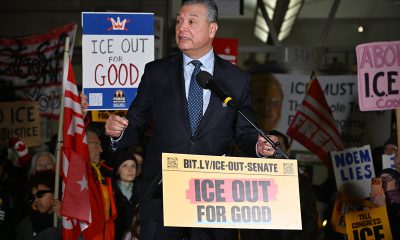
 Congress4 days ago
Congress4 days agoPadilla speaks at ‘ICE Out for Good’ protest in D.C.
-
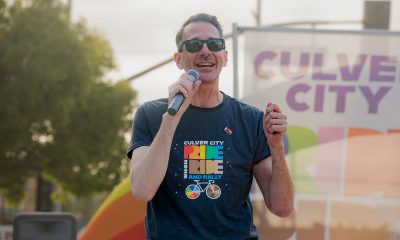
 Features4 days ago
Features4 days ago“We will get through all of this”: Culver City’s first LGBTQ+ Mayor discusses queer community and hope
-
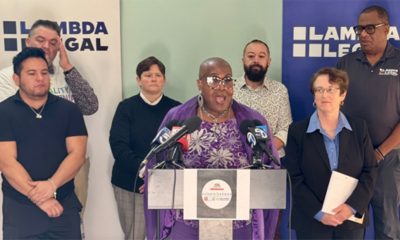
 Los Angeles2 days ago
Los Angeles2 days agoAdvocates demand that trans youth be protected as cases are argued in Supreme Court
-
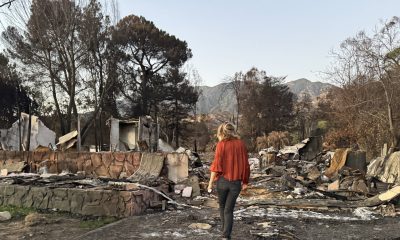
 Film2 days ago
Film2 days ago‘All The Walls Came Down’ gives a voice for the Altadena fire survivors
-
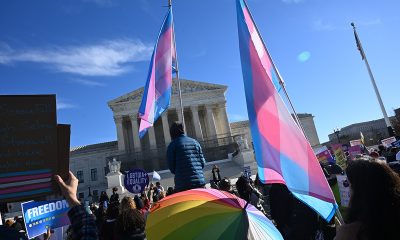
 U.S. Supreme Court4 days ago
U.S. Supreme Court4 days agoCompeting rallies draw hundreds to Supreme Court
-

 Movies3 days ago
Movies3 days agoRise of Chalamet continues in ‘Marty Supreme’
-

 Dorian Film Awards4 days ago
Dorian Film Awards4 days ago‘One Battle After Another,’ ‘Sorry, Baby’ and ‘Sinners’ among 2026 Dorian Film Award nominees
-
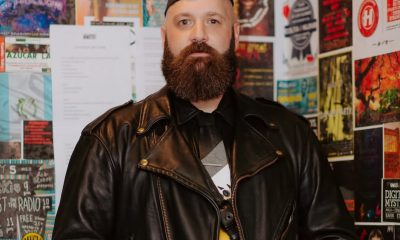
 Leather community3 days ago
Leather community3 days agoBEAR SIGHTING: Looking into the next chapter with Mr. LA Leather Bear 2025 Mike Klipsch

